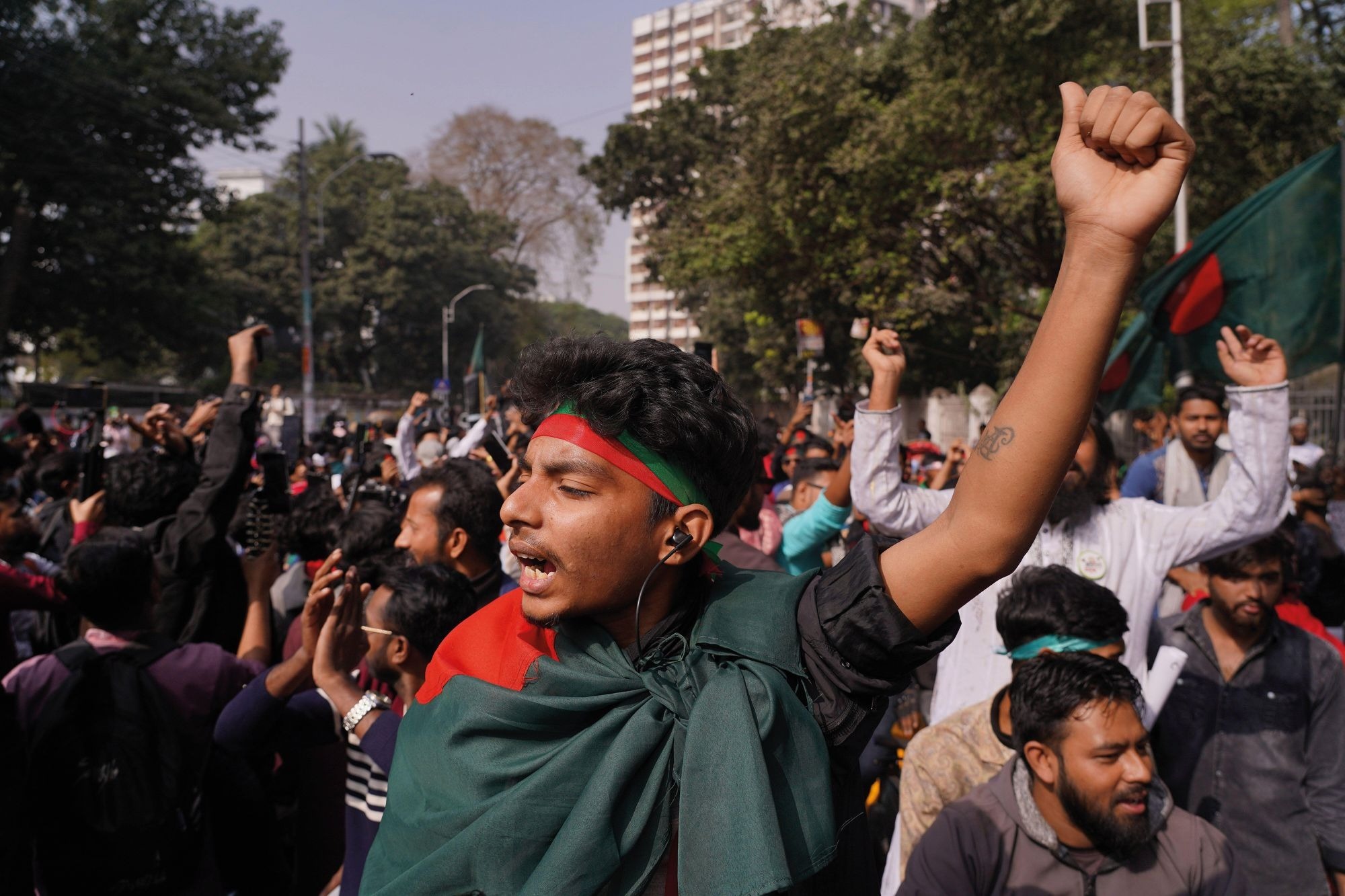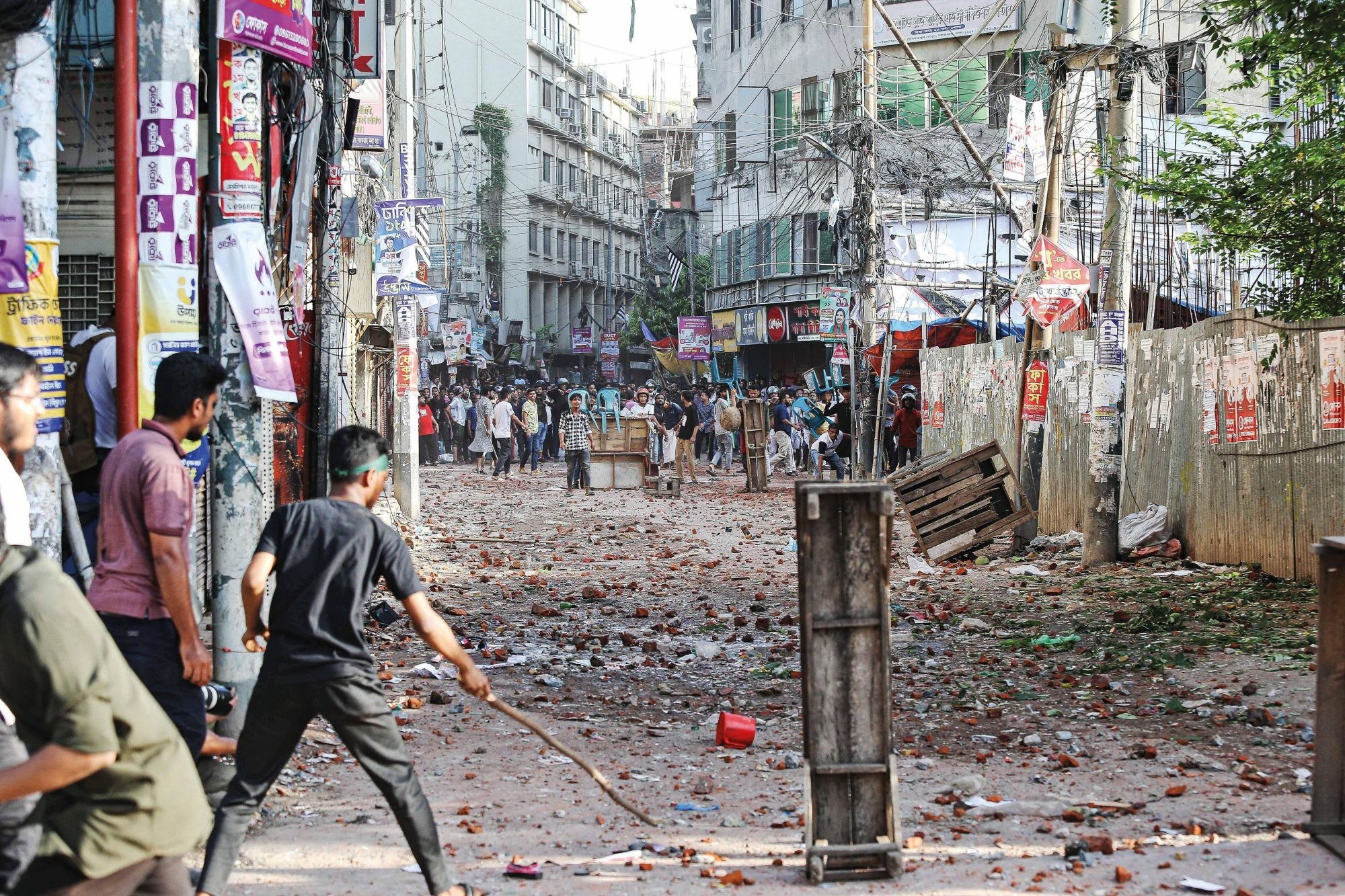Bangladesh’s student revolution unleashed chaos and sectarian violence. Can the coming elections renew its democracy?

History has shown that student uprisings often lead to nationwide revolt, and Bangladesh in recent years has been no exception. With former prime minister Sheikh Hasina forced out of office and reportedly seeking political refuge in India, an interim government now leads the country, including key figures from the student movement that led to her fall. With Nobel laureate Muhammad Yunus serving as interim leader since early August, the new government has improved freedom of speech, which was stifled under Hasina’s authoritarian rule, and given hope to many, particularly the younger generation.
But the situation is fragile. The ongoing political deadlock has led to a sharp decline in law and order, with some claiming that religious minorities are under increased threat. And as the country gears up for a national vote, possibly as early as December, the fight to fill the power vacuum is likely to intensify.
The turmoil started in the lead-up to the general election in January 2024. Opposition groups demanded Hasina’s resignation and called for a neutral caretaker government to ensure free and fair elections, citing reports of voter intimidation, ballot stuffing and arrests of opposition figures during previous election cycles. Nonetheless, Hasina’s Awami League – the country’s oldest and most established political party – went on to secure its fourth consecutive term, with voter turnout at only 41.8 per cent, according to the Bangladesh Election Commission.
But the discontent did not simmer down, and in July a major student-led movement erupted onto the streets. The trigger was the government’s reinstatement of a controversial job quota system favouring descendants of 1971 Liberation War veterans. Students saw this as a threat to merit-based opportunities, sparking widespread outrage. The movement, fuelled by economic hardship and allegations of human rights abuses, turned university campuses into hubs of resistance, with young activists leading mass demonstrations despite crackdowns by security forces.
The summer demonstrations drew large crowds, including student leaders who later transitioned into mainstream politics. Notably, Nahid Islam, a key figure in the protests, now leads the newly-formed National Citizen Party (NCP), which is part of the current government. The party says its focus will be on education, healthcare, climate change and addressing the specific needs of the nation’s youth. Bangladesh is the eighth most populous country in the world with 170 million people, roughly 28 per cent of whom are aged between 15 and 29 years. The NCP claims to represent the student movements, which involved many young people who took great risks to oppose the government.
One 26-year-old student, Yusuf Neel, who supports the NCP, said he “sheltered many hundreds of international students during the student uprising” when they had nowhere else to go. “I felt it was my duty to protect my fellow students while also taking part in the movement.” He said that the Awami League had perfected the use of media manipulation to control the public narrative.
Controversial legislation hampered freedom of speech – such as the Cyber Security Act, which granted the government broad powers to arrest, detain and prosecute individuals for online content deemed defamatory or false.
Neel also pointed to the use of violence, fear and coercion, recalling in particular the party’s long history of weaponising sexual violence. “There are documented cases where opposition members or their families were targeted to silence dissent. A mother of four was gang-raped for simply voting against [them].” (Sixteen people, including a local Awami League leader, were convicted in this case, which happened during the 2019 elections.)
When Hasina escaped in a helicopter on 5 August, it was generally reported by the western media as a win for freedom, democracy and equality in Bangladesh. The “Iron Lady” who had presided over a reign of terror for decades had finally departed. This was the first “Gen Z revolution”, empowering a younger generation.
Now leading the interim government is 84-year-old Muhammad Yunus, who answered a call by student protesters to take up the position temporarily. Known as the “banker to the poor”, Yunus was awarded the Nobel Peace Prize in 2006, after lending around $6 billion in housing, student and micro-enterprise loans – with a focus on supporting Bangladeshi women – through the bank he founded. “Bangladesh can be a beautiful country, but we destroyed the possibilities,” he said on taking up his position in August. Gesturing to the students in the crowd, he said: “Now we have to build a seedbed again – the new seedbed will be built by them.”
But the overthrow of Hasina has left a power vacuum and a demoralised army and police force, who had been loyal to the former government. Last year was the most violent in Bangladesh since the Liberation War, with unrest spilling over into this year. That has led to ongoing questions over justice and national unity. As the country gears up for elections, this transition period will prove vital for its future.
Violence unleashed

While Yunus presides over the unelected interim government, the established political parties are jostling for power. The largest are the Bangladesh Nationalist Party (BNP) and Jamaat-e-Islami. The BNP’s ideology is rooted in nationalism, blending Islamic values with a focus on economic development. Jamaat-e-Islami, which also has millions of supporters, was barred from contesting elections in 2013 after high court judges ruled that its Islamist charter violated the secular constitution of Bangladesh. During the student revolt, Hasina banned the party outright, accusing it of “terrorist activities”. The interim government has since removed this ban, saying there was no evidence behind it.
Muslims account for 91 per cent of Bangladeshis, with Hindus making up roughly 8 per cent. While the Hindu population had already suffered from persecution, the situation appears to have worsened since the fall of Hasina. Bangladesh’s leading minority rights organisation, the Bangladesh Hindu Buddhist Christian Unity Council, has accused the interim government of neglecting its duty to safeguard religious and ethnic minorities from violence and harassment – a charge the government denies. The council has been tracking incidences of communal violence, and claims that between 21 August and 31 December last year, religious minorities suffered 174 attacks, including 23 murders. It said other incidents involved rape, vandalism, looting and forcible take-over of property and businesses.
The motives for this violence remain unclear. While some attacks may target minorities due to their faith, others could be politically driven, as many Hindus have historical ties to the Awami League, which has long protected minority rights. The interim government insists that the recent violence against minorities has not been driven by religious differences. “These tragic deaths were caused by troublemakers, driven by factors such as personal disputes, theft, domestic conflicts and reckless behaviour,” it said in a March statement. However, there is evidence that banned militant groups like Hizb ut-Tahrir, whose stated aim is the re-establishment of the global Islamic caliphate, are taking advantage of the political chaos to strengthen their position. According to the Global Sufi Organisation, extremist groups have attacked over 100 shrines and holy places of the Sufi Muslim minority across the country in the past six months.
Meanwhile, Bangladesh is still reeling from the violence and unrest unleashed by the student revolt. The protests had started out peacefully in July. But as security forces responded with tear gas, rubber bullets and mass arrests, protesters grew more defiant. Meanwhile, pro-government student groups like Bangladesh Chhatra League (BCL) were mobilised and joined the fray, further inflaming the violence. BCL had always described itself as a champion of democracy and pluralism. However, in recent years, reports indicated a shift towards exerting monopolised power within schools and universities. Amnesty reported an attack on students on 15 July – the key day that violence broke out – by individuals “armed with rods, sticks and clubs, with a few even brandishing revolvers”. Within hours of this attack, it said, “a pattern emerged across the country with similar attacks coordinated by people believed to be members of the Bangladesh Chhatra League.”
Some demonstrations spiralled into riots, with vandalism, arson and attacks on public property amid a country-wide internet blackout that lasted for 11 days. The United Nations human rights office estimated that up to 1,400 people may have been killed during the crackdown, which involved “systematic” rights violations that could constitute crimes against humanity. Approximately 12-13 per cent of those killed were children. While the report focuses on human rights violations by Hasina’s government and associated forces, it also describes “retaliatory killings” and attacks committed by opposition groups, as the former government started to lose control of the country.
Many Awami League supporters, of which there are still millions across the country, believe the interim government has taken power unconstitutionally and given undue leniency to opposition supporters who were involved in last summer’s violence.
Saddam Hussain is the president of the Bangladesh Chhatra League. He was forced to flee the country and spoke to New Humanist from an undisclosed location. “Today, Bangladesh faces the risk of turning into an extremist state endangering both national and regional security,” he said. He accuses the interim government of being undemocratic and unjust. “The biggest example of lawlessness has been created by the current unconstitutional government when it discarded our constitution and granted indemnity to those involved in the killings of July-August, 2024,” he said.
Meanwhile, political instability has continued to fuel protests, violence and unrest. The military is currently maintaining order with thousands of personnel on the streets. In late February, General Zaman, the chief of army staff, said there was “an urgent need for national unity and institutional discipline”. He addressed those involved in the violence, saying: “If you can’t move beyond your differences and continue meddling and fighting among yourselves, and if you continue to kill one another, the independence, sovereignty and integrity of the country will be at risk – I warn you.”
Newfound freedoms and reforms
Despite the political unrest, many in Bangladesh are still optimistic. Journalists are more free to be critical of the interim government, which has proposed replacing the controversial Cyber Security Act with new legislation aimed at protecting freedom of expression. The economy may be turning a corner after the World Bank projected growth with a potential rise of 5.4 per cent in 2026, contingent on political stability and economic reforms. Initiatives are underway to address Bangladesh’s broken institutions, offering hope for change. However, there is uncertainty about the sustainability of these changes after new elections. Others point out that there should be a limit to what the interim government is able to do, given it has no electoral mandate.
Yusuf Neel, who has continued his business studies at the Independent University in Dhaka, is hopeful that his country is heading in the right direction. “Things are much better than before. The economy is stabilising, and freedom of speech has been restored. However, the remnants of the old regime are still attempting to create chaos,” he said.
While Bangladeshis disagree over the source of their country’s current instability, everyone is suffering from the increase in crime. Political chaos means that law enforcement is stretched thin, leading to a surge in offences, particularly at night. Since Hasina’s fall, the streets have grown increasingly perilous. Police data for January 2025 show spikes in reports of robbery and abduction compared to January 2024, as well as the highest number of muggings in a single month for at least six years.
Sahiba Shah, an Indian national studying medicine in Dhaka, says she and her friends are struggling to adapt to the disruptions. “We avoid certain parts of the city at night and stay extra cautious with our belongings because burglaries have increased around us,” she said. Medical universities have increasingly become hubs for political activity, leading to class disruptions and strikes. Shah says escalating violence has made her anxious about her safety and academic future. “Girls are also being victims of continuous harassment since nobody’s holding people accountable for anything that’s been happening,” she added.
While much of the country appeared to initially back the interim government, growing impatience over economic struggles and law and order is evident, said Michael Kugelman, director of the South Asia Institute at the Wilson Center in Washington. “The interim government took office amid sky-high expectations, but with such ambitious goals, it’s been hard to deliver on all fronts,” he said. Critics blame the interim government for continued violence and lawlessness, demanding the restoration of democracy, the constitution and the protection of the rights of minorities. Yet its supporters see these claims as attempts to discredit the student movements, and to undermine interim leader Muhammad Yunus, who has consistently fought for social progress and economic justice.
Sultan Mohammed Zakaria, joint convenor of the National Citizen Party, the ruling party, believes the crisis is manageable but warns of escalating tensions. “The biggest challenge for the government is to tackle law and order. Given the vast majority of law enforcement agencies and their members were tools of repression during the [rule of] deposed dictator Sheikh Hasina, her departure left these institutions shattered and demoralised,” he said. He acknowledged public frustration with rising crime, attributing it to police inaction and a lack of leadership in the Home Affairs Ministry. “I think Bangladesh is in a serious transition. The future of the country depends on how well it can manage.”
Significant hurdles must be overcome, from security threats to the resurgence of banned extremist groups. If the coming elections – which will likely be held in the first half of 2026 – are free and fair, they could mark a turning point; if marred by violence or manipulation, Bangladesh risks plunging further into instability. “The only acceptable solution to Bangladesh’s current crisis is the establishment of democracy, the empowerment of the people, and ensuring that the state is governed by elected representatives,” says Saddam Hussain. Most Bangladeshis hope for a better tomorrow that safeguards a sense of security, freedom and fundamental human rights.
The primary goal of any new leadership must be to restore democracy and counter rising fundamentalism through social, cultural and political resistance. It must also prioritise meritocracy and equal opportunities regardless of faith, ethnicity or party affiliation, and ensure that higher education institutions remain free from extremist political influence. “Bangladesh stands at a crossroads,” says Zakaria. “The road ahead offers both promise and uncertainty.”
This article is from New Humanist’s Summer 2025 issue. Subscribe now.


